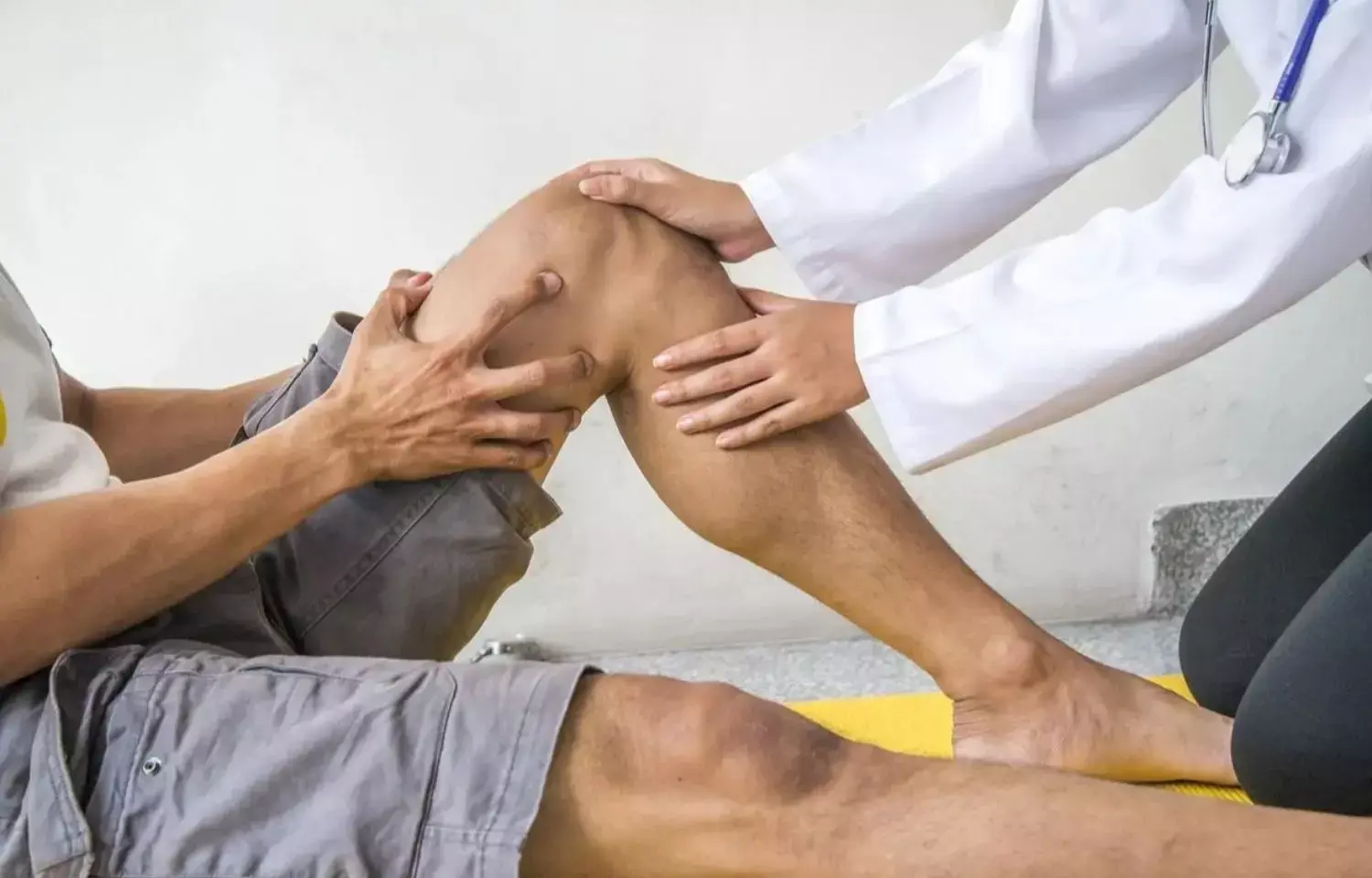- Home
- Medical news & Guidelines
- Anesthesiology
- Cardiology and CTVS
- Critical Care
- Dentistry
- Dermatology
- Diabetes and Endocrinology
- ENT
- Gastroenterology
- Medicine
- Nephrology
- Neurology
- Obstretics-Gynaecology
- Oncology
- Ophthalmology
- Orthopaedics
- Pediatrics-Neonatology
- Psychiatry
- Pulmonology
- Radiology
- Surgery
- Urology
- Laboratory Medicine
- Diet
- Nursing
- Paramedical
- Physiotherapy
- Health news
- Fact Check
- Bone Health Fact Check
- Brain Health Fact Check
- Cancer Related Fact Check
- Child Care Fact Check
- Dental and oral health fact check
- Diabetes and metabolic health fact check
- Diet and Nutrition Fact Check
- Eye and ENT Care Fact Check
- Fitness fact check
- Gut health fact check
- Heart health fact check
- Kidney health fact check
- Medical education fact check
- Men's health fact check
- Respiratory fact check
- Skin and hair care fact check
- Vaccine and Immunization fact check
- Women's health fact check
- AYUSH
- State News
- Andaman and Nicobar Islands
- Andhra Pradesh
- Arunachal Pradesh
- Assam
- Bihar
- Chandigarh
- Chattisgarh
- Dadra and Nagar Haveli
- Daman and Diu
- Delhi
- Goa
- Gujarat
- Haryana
- Himachal Pradesh
- Jammu & Kashmir
- Jharkhand
- Karnataka
- Kerala
- Ladakh
- Lakshadweep
- Madhya Pradesh
- Maharashtra
- Manipur
- Meghalaya
- Mizoram
- Nagaland
- Odisha
- Puducherry
- Punjab
- Rajasthan
- Sikkim
- Tamil Nadu
- Telangana
- Tripura
- Uttar Pradesh
- Uttrakhand
- West Bengal
- Medical Education
- Industry
Education, exercise before total knee replacement may not improve surgery outcomes: JAMA

France: Findings from a trial showed that exercises and education prescribed as rehabilitation prior to total knee replacements (TKR) may not significantly improve surgery outcomes. The trial findings questions the utility of prehabilitation before TKR to improve functional outcomes.
"We found no evidence that multidisciplinary prehabilitation before TKR for osteoarthritis improve short-term functional independence or reduces midterm activity limitations following the surgery," Christelle Nguyen, Cochin Hospital, University Center, Paris, France, and colleagues wrote in their study published in JAMA Network Open.
Osteoarthritis, the most common form of arthritis, is a leading cause of years lived with disability in the world. It affects all anatomical structures of the joint and results in progressive joint destruction.
Physical and functional status before TKR is tied to recovery after surgery in knee osteoarthritis patients. Evidence suggests that exercise therapy, physiotherapy, occupational therapy, and education performed before TKR (ie, rehabilitation) as stand-alone interventions or in multidisciplinary rehabilitation education programs may cause a slight improvement in physical and functional outcomes in the perioperative period and reduce the length of hospital stay. However, there is a dearth of large clinical trials assessing the short-term and midterm effects of this type of program.
Against the above backdrop, Dr. Nguyen and colleagues aimed to compare multidisciplinary prehabilitation with usual care before TKR for osteoarthritis in terms of functional independence and activity limitations after surgery in a prospective, open-label randomized clinical trial.
The trial recruited people aged 50 to 85 years of age with knee osteoarthritis according to the criteria of the American College of Rheumatology for whom a TKR was scheduled at 3 French tertiary care centers. Recruitment initiation was done on October 4, 2012, with follow-up completed on November 29, 2017. Statistical analyses were performed from March 29, 2018, to March 6, 2019.
A total of 262 patients (mean age, 68.6 years; 178 women [68%]) four supervised sessions of multidisciplinary rehabilitation and education (n=131) or usual care (n=131) was given to the participants before TKR. Multidisciplinary rehabilitation and education consisted of 2 sessions per week, and was performed at least 2 months before TKR, delivered to groups of 4-6 participants at each investigating center with a session duration of 90 minutes that included 30 minutes of education followed by 60 minutes of exercise therapy. Usual care comprised of information booklet and standard advice by the orthopedic surgeon.
The proportion of participants achieving functional independence a mean of 4 days after surgery defined as level 3 on the 4 functional tests was the short-term primary end point. The midterm primary end point was activity limitations within 6 months following TKR assessed by the area under the receiver operating characteristic curve of the self-administered Western Ontario Questionnaire and McMaster Universities Osteoarthritis Index function subscale.
Salient findings include:
- A mean of 4 days after surgery, 34 of 101 (34%) in the experimental group vs 26 of 95 (27%) in the control group achieved functional independence (risk ratio, 1.4).
- At 6 months, the mean area under the curve for the Western Ontario Questionnaire and McMaster Universities Osteoarthritis Index function subscale was 38.1 mm2 in the experimental group vs 40.6 mm2 in the control group (absolute difference, −2.8 mm2 after multiple imputation).
- No differences were found in secondary outcomes.
"This randomized clinical trial found no evidence that a multidisciplinary rehabilitation education program prior to TKR improves functional independence or reduces activity limitations in people with knee osteoarthritis after surgery," wrote the authors. "However, the interpretation of the results of this trial is limited by the low uptake of the experimental intervention."
Reference:
Nguyen C, Boutron I, Roren A, et al. Effect of Prehabilitation Before Total Knee Replacement for Knee Osteoarthritis on Functional Outcomes: A Randomized Clinical Trial. JAMA Netw Open. 2022;5(3):e221462. doi:10.1001/jamanetworkopen.2022.1462
KEYWORDS: JAMA, total knee replacements, knee surgery, rehabilitation, knee osteoarthritis, rehabilitation, surgery, functional outcomes, Christelle Nguyen, education, exercise
Dr Kamal Kant Kohli-MBBS, DTCD- a chest specialist with more than 30 years of practice and a flair for writing clinical articles, Dr Kamal Kant Kohli joined Medical Dialogues as a Chief Editor of Medical News. Besides writing articles, as an editor, he proofreads and verifies all the medical content published on Medical Dialogues including those coming from journals, studies,medical conferences,guidelines etc. Email: drkohli@medicaldialogues.in. Contact no. 011-43720751


